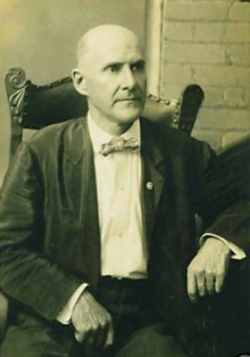The working class and the employing class have nothing in common.
There can be no peace so long as hunger and want are found
among millions of working people and the few, who
make up the employing class, have
all the good things of life
Friday August 3, 1906
From The Worker: Debs on Industrial Unionism

Over the next for days we offer the response made by Eugene V. Debs to the questions posed by the New York Worker regarding the debate on the relation of the Socialist Party of America to the trades unions.
The Worker introduces what it calls a symposium:
The question of the relation of the Socialist Party to the trade unions having again attracted attention within our ranks, The Worker has inaugurated a symposium to which representative comrades are being invited to contribute, setting forth various points view.
Questions are set forth for the comrades to address which cover the subject of industrial unionism versus craft unionism, working from within the existing trade unions versus forming new organizations, and the last question:
What do you think ought to be the attitude of the Socialist Party, as such, toward the organizations of labor on the economic field?
From The Worker of July 28, 1906:
The Socialist Party and the Trade Unions.-XI.
by Eugene V. Debs
[Part I]
The very limited time at my command makes it impossible for me to write an article on industrial unionism that will satisfactorily serve the purpose of the symposium of The Worker and under the circumstances I can but hope to meet the general requirements of the discussion, and even this may be but imperfectly accomplished.
Industrial unionism, as I understand it, is an outgrowth of modern industrial development; it means, primarily, the unification of all the industrial workers within one comprehensive organization, divided and subdivided into departments corresponding to their various industries, each supreme within its own jurisdiction, yet limited by, and subject to, the constitution and other enactments of the general organization, the purpose being prompt and efficient action and mobility of power in every movement, offensive and defensive, of the organized workers, in part or as a whole, in all matters pertaining to their industrial interests.
Under this form of organization all the workers of a given employer, or in a given industry, however varied their trades or occupations, are compactly organized in the same body, while at the same time distributed among the various departments representing their several trades and occupations.
The superiority of this form of organization over the antiquated and impossible autonomic plan in this day of concentration is so apparent that argument would weaken rather than strengthen the proposition.
Next, industrial unionism is class-conscious in character and revolutionary in aim, its mission being not only to mitigate the ills of the workers, but to abolish the wage-system and achieve complete emancipation. Without this character and ultimate end in view the mere solidarity of the trade amounts to nothing more than “pure and simpledom,” and cannot properly be called industrial unionism. This does not mean that each member must be class-conscious and revolutionary, but that the organization must be so as a whole and so declare, as the Industrial Workers has done, in its organic law.
With this general understanding of what industrial unionism is—to which, I do not doubt, exception will be taken—the Industrial Workers of the World is the only American labor union of a general character organized upon the principle of industrial unionism.
The Industrial Workers has no “patent” on this “scheme,” as some of its critics have facetiously charged, but it is so far the only union organized upon the industrial basis, with its militant character stamped upon it and its revolutionary aim boldly avowed and clearly stated in its fundamental law.
Up to this point I apprehend that there is but little difference of opinion among Socialists, in or out of the Industrial Workers or the Socialist Party.
The trouble begins with the revolt of the progressive element of its membership against the American Federation of Labor and, curiously enough, the most violent critics of this industrial secession from the American Federation of Labor in 1897 (beginning with the withdrawal of the Western Federation of Miners) themselves, 2 years later, in 1899, organized the political secession form the Socialist Labor Party
They persist in asking us why we did not remain in the American Federation of Labor and “bore from within,” and we ask them why they did not remain in the Socialist Labor Party and do likewise, instead of bolting and setting up a rival party.
They criticize and condemn us unsparingly for “dividing” the workers industrially and organizing “dual” unions. Then why did they divide the workers politically and organize dual locals?
Is revolt against a labor party a virtue and revolt against a labor union a crime?
Upon what principle of reasoning and by what rule of logic is the one commended and the other condemned?
The revolt against [and?] our secession from the American Federation was not only timely and wisely ordered, but simply inevitable, and in due time will be vindicated as a historic necessity.
Upon this point I feel strongly tempted to digress sufficiently to make clear my reason for justifying the break with the A. F of L. and the necessary argument in support thereof, which I am presumptuous enough to believe is conclusive and unanswerable, but neither time nor space will allow at this writing.
~~~~~~~~~~~~~~~~~~~~
SOURCE
The Worker
(New York, New York)
-July 28, 1906, page 6
http://www.genealogybank.com
IMAGE
Eugene Debs, Wilshire’s Magazine, Nov 1905
pdf! https://www.marxists.org/history/usa/parties/spusa/1905/1100-debs-winningaworld.pdf
See also:
The article at Debs Internet Archive
pdf! https://www.marxists.org/history/usa/parties/spusa/1906/0728-debs-spandunions.pdf
IWW Constitution and By-Laws, 1905
https://babel.hathitrust.org/cgi/pt?id=mdp.39015079028836;page=root;view=image;size=75;seq=1;orient=0
One Big Industrial Union – May Day Chorus of Asheville
Lyrics: Paint ‘er Red by Ralph Chaplin
http://www.library.arizona.edu/exhibits/bisbee/docs/027.html#PAINT
